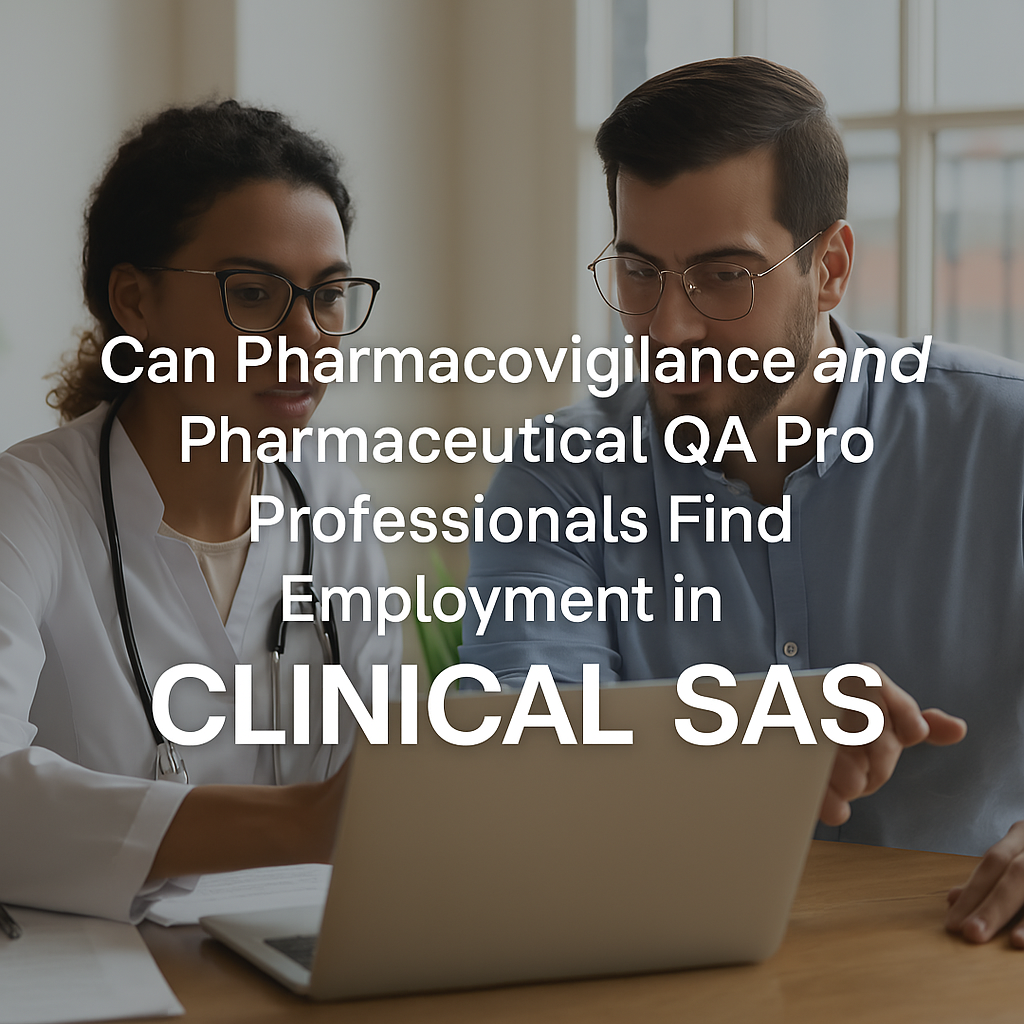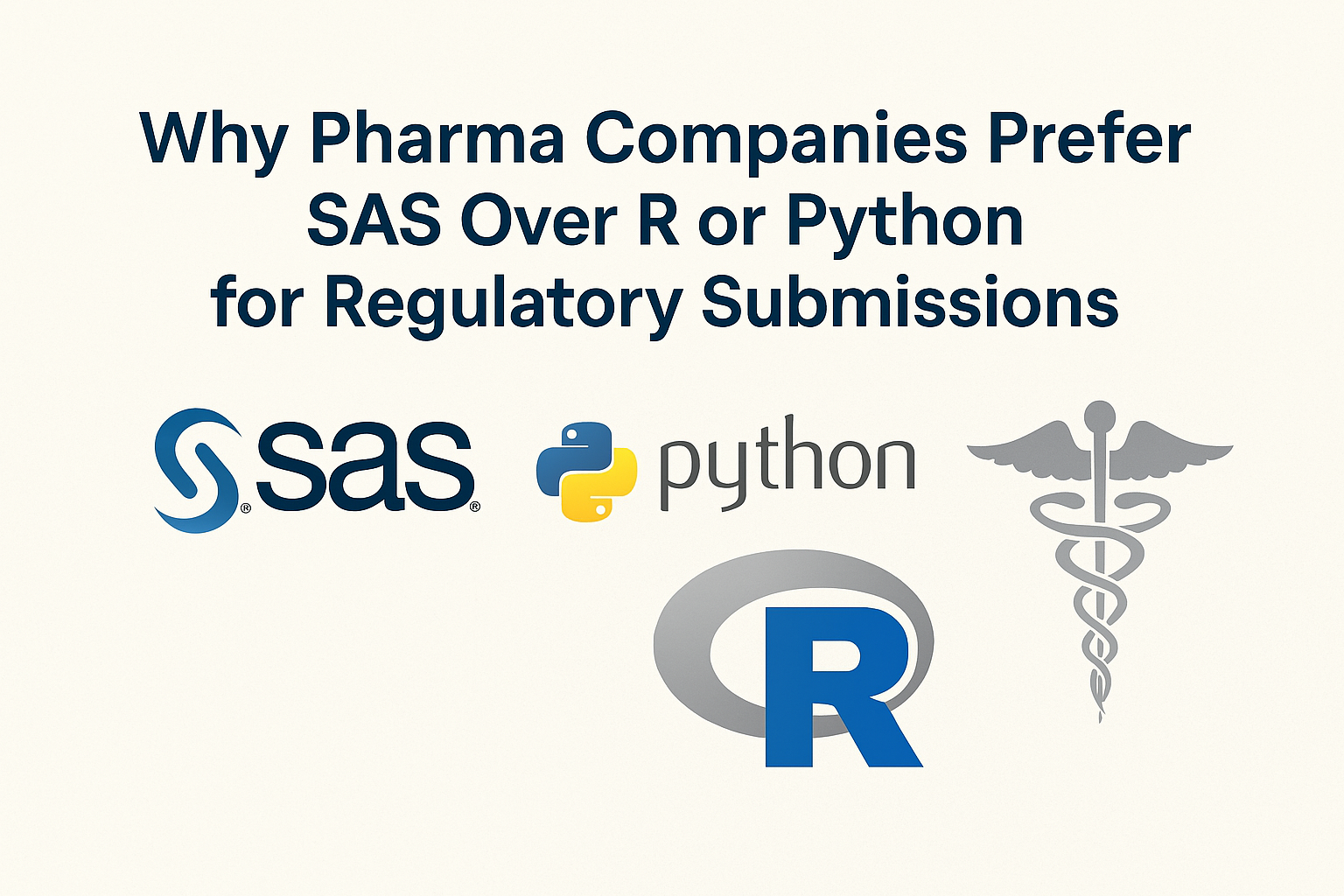
- by Handson
- April 5, 2025
Can Pharmacovigilance and Pharmaceutical QA Professionals Find Employment in Clinical SAS?
In the rapidly evolving pharmaceutical landscape, Clinical SAS has emerged as a high-demand skill set—previously dominated by statisticians and data analysts, but now attracting professionals from pharmacovigilance and quality assurance roles.
If you're a pharmacovigilance or pharmaceutical QA professional wondering whether a transition into Clinical SAS is realistic, the answer is a confident yes.
Pharmacovigilance Professionals: Your Skills Are Transferable
Pharmacovigilance experts already work with complex safety datasets, adverse events, and regulatory submissions—areas where Clinical SAS plays a major role.
You Already Know:
- How to handle MedDRA-coded safety data
- How to draft narratives and manage case processing
- What regulatory bodies like FDA, EMA, and MHRA expect in safety reporting
With Clinical SAS, You Can Move Into Roles Like:
- Safety SAS Programmer
- Adverse Event Data Analyst
- Clinical SAS Specialist (Pharmacovigilance focus)
Professionals upskilling through a live online instructor-led SAS training often land roles in CROs and regulatory organizations due to their domain knowledge + SAS capability.
Pharmaceutical QA Professionals: You're Already Doing Half the Job
QA professionals are built for Clinical SAS roles—why? Because compliance, validation, and accuracy are at the core of both QA and SAS programming.
Key Strengths QA Experts Bring:
- Deep understanding of GCP, GLP, and 21 CFR Part 11
- Experience in conducting audits and validations
- Focus on standard operating procedures and documentation
These strengths make you ideal for:
- Clinical Data Reviewer or Validator
- SDTM/ADaM QC Analyst
- SAS Programming Quality Assurance Roles
With the right Clinical SAS training program for professionals, you can bridge the technical gap quickly and confidently.
Why Base SAS Global Certification Matters in the Transition
One of the smartest moves for professionals from PV or QA backgrounds is to obtain the Base SAS Global Certification. It’s an internationally recognized credential that validates your technical capabilities.
Certification Benefits:
- Makes your resume stand out in SAS hiring pipelines
- Proves hands-on proficiency with data manipulation, PROC SQL, and reporting
- Builds trust with recruiters and project managers unfamiliar with your domain
Completing a globally acknowledged SAS certification training with placement support boosts your transition success significantly.
Top Job Profiles for Pharmacovigilance/QA + SAS Professionals
|
Job Title |
Focus Area |
|
Safety Data Programmer |
Adverse events, SAE listings, signal detection |
|
Clinical Data QA Analyst |
Validating SAS outputs, GCP/GMP documentation |
|
CDISC SDTM/ADaM QC Analyst |
Reviewing datasets for compliance |
|
Clinical Analytics Coordinator |
Supporting trial analytics and submissions |
Most employers prefer candidates with domain + technical knowledge. This combo is rare—and highly paid.
The CRO & Pharma Industry Perspective
Clinical Research Organizations and pharma companies actively recruit cross-skilled professionals. If you can write a validated SAS program and understand a protocol, you're already ahead.
“We’re seeing a trend of PV and QA professionals becoming highly effective in Clinical SAS roles after structured training.” – HR Manager, Global CRO
Explore a practical, results-oriented SAS training course for clinical trial professionals that focuses on real-world datasets and regulatory alignment.
For pharmacovigilance and pharmaceutical QA professionals, Clinical SAS isn’t a far leap—it’s a natural evolution. With the right training and globally recognized certification, you’ll position yourself for roles in biostatistics, regulatory submissions, and clinical programming.
Your existing domain knowledge is an asset. Combine it with Base SAS skills, and you’ll become a top candidate in the world of clinical research analytics.
Ready to take the next step in your career?
Explore a career-oriented SAS training institute for life science professionals offering hands-on projects, personalized mentoring, and job support.





